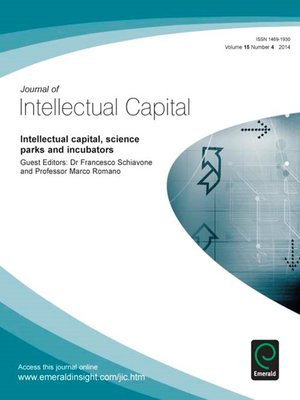Journal of Intellectual Capital, Volume 15, Issue 4
ebook ∣ Journal of Intellectual Capital
By Rory Chase

Sign up to save your library
With an OverDrive account, you can save your favorite libraries for at-a-glance information about availability. Find out more about OverDrive accounts.
Find this title in Libby, the library reading app by OverDrive.



Search for a digital library with this title
Title found at these libraries:
| Library Name | Distance |
|---|---|
| Loading... |
Intellectual capital (IC) is a critical driver for the success and survival of every organisation. Human capital of the entrepreneur, organisational capital and relational capital (the typical dimensions of IC) affect greatly the performance of new companies. The creation and management of IC is more articulated if business start-ups are localised within an incubator or science park. The American National Business Incubators Association (NBIA) defines business incubation as "business support process that accelerates the successful development of start-up and fledgling companies by providing entrepreneurs with an array of targeted resources and services". Science parks, instead, are "organisations managed by specialised professionals, whose main aim is to increase the wealth of its community by promoting the culture of innovation and the competitiveness of their associated businesses and knowledge-based institutions. To enable these goals to be met, a Science Park stimulates and manages the flow of knowledge and technology amongst universities, R&D institutions, companies and markets; it facilitates the creation and growth of innovation-based companies through incubation and spin-off processes; and provides other value-added services together with high quality space and facilities" (IASP - International Association of Science Park, 2002). In Science Parks, "there is a strong need to combine knowledge theory and business practice, a strong need to strengthen the cooperation between two different environment: research and business" (Kohl and Al Hashemi, 2011). Therefore, in both incubators and science parks the management of intangible resources is a great challenge and needs a special focus.
IC of incubated start-ups depends on both their own intangible assets and the knowledge, experiences, processes of the business incubator and/or science park. On one hand, prior research reports the human capital of the entrepreneur is the most important dimension of IC for new ventures localised within business incubation centres and/or science parks. Therefore, managers of these knowledge-based organisations should pay great attention to this determinant. On the other hand, these structures create own intangible assets and share them with their tenant firms. Dimensions of IC within business incubators have interactive relationships and affect the growth of the tenant firms in different ways: all the typical dimensions of IC (human capital, structural capital, relational capital) affect positively the knowledge transfer from the business incubator to the tenant firms; human capital is probably the most important between these dimensions as it affects positively all the others. Therefore, the incubated business start-ups should make continuous efforts (e.g. in the organisation of their internal processes or the enhancement of their absorptive capacity) to exploit as much as possible the invisible assets provided by their incubators.
Despite these evidences, two years ago we felt the subject of IC within science parks and business incubators was still largely improvable. Thus, we felt the need of developing more this subject by providing more evidences, replying to more research questions and testing unverified hyphoteses. This JIC special issue is the final output of these efforts.
The articles chosen to include in this issue develop a wide range of theoretical and empirical perspectives. Some articles focus on the status of theory and research about IC within science parks and business incubators by analyzing traditional various domains, such as innovation strategies, finance, strategy, and public policies. Other articles focus more explicitly on the rising connection between...







